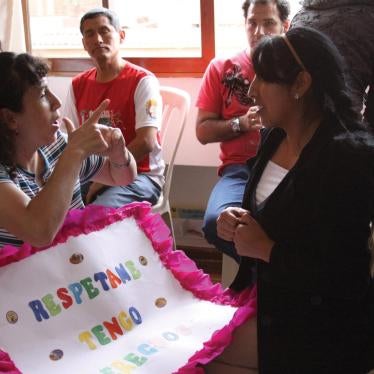(New York) – Peru’s decision to restore voting rights to thousands of people with disabilities is an important step toward ensuring their full participation in society, Human Rights Watch said today. More than 23,000 people with mental and intellectual disabilities had been excluded from the voter registry for the 2011 presidential elections in April and June based on previous government policy.
The National Registry of Identification and Civil Status issued a resolution on October 10, 2011, to nullify policies excluding people with certain mental and intellectual disabilities from the electoral rolls. The registry also pledged to work with relevant government agencies to ensure prompt resolution of this situation. This achievement was the result of years of advocacy by the Ombudsman’s office and local disabled persons organizations.
On October 14, the registry presented a new national identity card, with the voting group assignment required to permit her to vote, to Maria Alejandra Villanueva, a young woman with Down syndrome who recently spoke at the United Nations about being barred from voting in Peru.
“It seems that Peru has recognized that the arbitrary exclusion of thousands of its citizens from the right to vote, as has been the situation, calls into question the very essence of what it means to be a democratic society,” said Shantha Rau Barriga, disability rights researcher and advocate at Human Rights Watch. “But Peru still needs to change its civil code to make sure that all people with disabilities are guaranteed the right to full political participation.”
Peru’s Civil Code limits the rights of people with disabilities to exercise their voting rights, declaring that some people, including those with multiple sensory disabilities, are “absolutely incapable” of exercising civil rights, and that their legal representatives must exercise these rights in their stead. These provisions contravene the Convention on the Rights of Persons with Disabilities, ratified by Peru in January 2008, which states that “persons with disabilities enjoy legal capacity on an equal basis with others in all aspects of life,” which includes voting and political participation.
Human Rights Watch has been monitoring the barriers to political participation for people with disabilities in Peru and globally over the past year. In November 2010, after a number of people with disabilities lodged complaints that they had been denied the right to vote and continued pressure from disabled peoples' organizations, officials in Peru admitted that some 20,000 people with intellectual and psychosocial disabilities had been excluded from the voter registry.
In some cases, they had been excluded as a matter of agency policy, and in other cases agency employees had made arbitrary decisions that they were not entitled or obligated to vote, since voting is mandatory in Peru. In early December, the registry invited them to re-register. But with limited time and poor communication about this decision, fewer than 60 people with disabilities were able to re-register before the voter registry closed. As a result, thousands of people with disabilities were barred from voting in the national elections.
“The presumption that people with mental and intellectual disabilities lack the capacity to vote is misguided and illegal,” Barriga said. “Voters choose to support candidates for all sorts of reasons. It would be absurd to suggest that all voters should prove their ‘voting competency’ before casting a ballot.”
The National Registry of Identification and Civil Status pledged in its October order to create a commission to address the fines charged to people with mental and intellectual disabilities who are unable to vote. The commission will consist of representatives of the National Jury of Elections, the National Electoral Office, the Ombudsman, the Commission on Social Inclusion, and Persons with Disabilities of Congress, and the National Council for the Integration of Persons with Disabilities(CONADIS).
The resolution also mandates the registry to issue national identity cards with voting assignments to everyone with a disability who had been excluded from the voter registry, including delivering the cards to them at home and without charge.
“This is an important step to restore voting rights to people with disabilities,” Barriga said. “But there is still some way to go to achieving equality and the government should also amend the Civil Code and other laws that undermine the rights and dignity of people with disabilities.”





